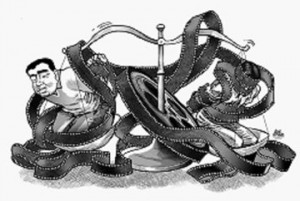
The Supreme Court ruled to prohibit the showing of the movie “The Innocence of Muslims” after the country’s Muslim groups filed a motion seeking to stop its public showing and denouncing it as insulting the prophet Mohammad and Islam.
The SC ban on the film, which sparked rallies and violent protests that claimed the life of an American ambassador and injured American embassy personnel, has yet to cover the film trailers on YouTube.
But considering that YouTube banned the video in countries with large Muslim populations, that may not be far off in this country.
The outrage caused by the “Innocence of the Muslims” isn’t as strong but is no less comparable to that which greeted the 1988 Martin Scorsese film “The Last Temptation of Christ” which continues to be banned in the Philippines, a bastion of Roman Catholicism in Asia.
On a smaller and more personal level, “Give Up Tomorrow” has also courted controversy due to its depiction of Cebuano convict Francisco “Paco” Larrañaga as the victim of a frame-up intended to satisfy the demand for justice by the family of two slain daughters as well as mask the gross, even downright criminal inadequacies of the country’s law enforcement and justice system.
Filmmakers Michael Collins and Marty Syjuco, who has ties with the Larrañaga clan, can at least lay claim to the fact that their independent film has received international accolades and stirred a a campaign to have Paco released from his jail in Spain.
Efforts to have the film shown in commercial theaters in Cebu has been met with reluctance by two of Cebu City’s major malls.
Thelma Chiong, mother of victims Marijoy and Jacklyn, said she won’t bother objecting to having the film shown here because she’s confidence that Cebuanos who have followed the 1997 crime against her daughters know the real story behind the conviction of Paco and six others held liable for kidnapping, rape and murder in the Regional Trial Court and the Supreme Court.
In Manila, the indie film was screened during the Cinemalaya film festival to much acclaim where the Chiong family and their supporters don’t necessarily have a strong presence unlike in Cebu. Theaters in Makati will show “Give Up Tomorrow” next week.
The film will surely reopen old wounds but more importantly it would challenge one’s certainty of whether the criminal justice system succeeded in this case.
The public may want to find out for themselves by seeing the film.